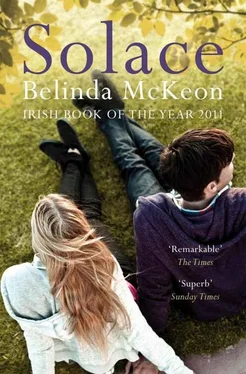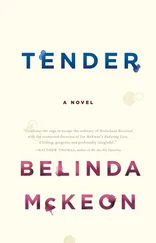It was on the following Saturday afternoon that Maura’s car met with an overtaking van on the Longford road. Joanne and Mark had come down to Dorvaragh that morning. Maura intended to throw Aoife a birthday party; there was a cake in Longford that she wanted to pick up. As she had been getting ready to leave the house, Aoife had woken up from her nap. ‘Sure come with me for the drive,’ Maura had said to Joanne. ‘There must be a few things you need to get in town.’
The miracle, everyone said afterwards, was that Aoife had escaped without so much as a bang on the head. Everyone talked about the new child seats, how sophisticated and modern they were, and quite a few people talked about mercy, and about how at least the little girl had been spared. But the truth was that Aoife had simply been lucky. That she had, purely by chance, been sitting at exactly the right distance from both sides of the car to stay shy of the inward crumpling. That she had been tiny enough not to have her neck broken by the car roof as it was thrown sideways against the wall. Mark pictured it for a long time afterwards, what the police and the firemen had told him about lifting this little red-haired thing clean and clear out of the wreckage — although it wasn’t that clean, he knew. They would have had to cut through the crushed metal of the roof before they had got that far, hoping to Jesus she would not die of some unseen wound or bleeding before then. But they described it to him as though it had been a sort of religious experience for them, getting this pale, quiet baby into their arms, not crying, not calling for her mother — and they told him this, he knew, so that he would think she had not suffered, that she had not seen anything, that she had not been hysterical with fear and incomprehension at anything she had seen. He thought, afterwards, about the use of that word ‘clean’ — because they had used it, more than one of them, the priest who had been there, too — and what it was meant to signify. That she had no blood on her. That she had no wounds. But also that she had not been touched by the blood of her mother. The blood of his mother. And at this he stopped himself. At this he knew he had gone far enough. This was more than they had told him. More than they had given him. What they had given him was this child, lying now in this pine cot, sleeping now, impossibly soundly, beneath a knitted blanket and a flannel sheet. Her cheeks were fiery red. Her forehead was damp. But it was normal, he told himself. She was teething.
With Mark gone back to the city, there was less for Tom to do in the morning. Tea could be made in a mug, the used bag tossed into the small bin on the draining-board. A slice of bread with butter and marmalade was enough for breakfast; the smell of bacon and pudding browning on the pan seemed too heavy now on the air of the small room. Afterwards, he would rinse the mug and the spoon and the plate and the knife and put them back in the cupboard, ready for the next morning. At midday he would make himself another mug of tea and eat a sandwich — baked ham well sharpened with salt — and later he would boil four potatoes, empty a can of baked beans into a saucepan, and fry a pork chop in a dark, spitting pool of butter and oil.
There were no longer enough scraps from the table to feed the dog. She followed him around the kitchen. He began to buy cans of dog food in Keogh’s. There was more than a euro in the difference between the cheapest and the most expensive. The brand he chose had a dog like her pictured on the label.
He spent most of the day outdoors, moving between the hayshed and the yard, the byre and the fields. He drove around the lower meadows and into the bog, over the back lane to call on Sammy Stewart or Jimmy Flynn, over to Keogh’s to shop for groceries. If he sat into the bar for a pint during the day, he took the newspaper with him. There were seldom many others there and they talked to him only of farming and of football, of the going prices for land or for animals, of the weather and how it had been. He had his pint, and he left, and he found something to tip around at for the rest of the day. The dog went everywhere with him, riding high in the cab of the tractor, her back pressed warm against his.
In the evenings, soap operas came on the television. He began to follow some of them. The Australian one after the news was for youngsters, he thought, but he liked looking at it, liked the scenes of fighting and smiling and fussing played out against the backdrop of the beach. The tumbling blueness of the waves and the sky filled the television screen. The girls were impossibly good-looking, blonde and suntanned, wearing short dresses and swimsuits. They were all very young. There was one older woman in it, and she, too, was very attractive, but she was made out, most of the time, to be a sort of laughing-stock. She gossiped or eavesdropped or interfered, and her actions always backfired. When the programme ended, always with a mystery or a surprise, he would go to the kitchen and cook his dinner, standing over the range until it was ready, turning the meat and stirring the beans, putting a plate in to warm when the potatoes yielded to the touch of a fork.
He ate at the kitchen table, drinking a glass of milk with his food. He spread butter thickly across the steaming potatoes cracked open on the plate. He sprinkled grains of salt and watched them melt. The dog sat at his feet. From the other room he could hear the drone of the television, bursts of talk and music and applause, and the louder blasts of the advertisements. When he had finished eating, he washed and dried the things he had used and returned to the armchair. Before the news at nine o’clock there were two English soaps and one set in Dublin, moving between offices and sitting rooms and pubs. In these, the women were older, their clothes duller, their mouths downturned, their accents either sullen or shrill. The men sat nursing pints in bars that were too quiet to be real. Outdoors, the skies always looked swollen with rain, but no rain fell. The young people’s lives were ruined with worries about sex and money and family. The old people worried about petty things, sick pets and broken ornaments and the carry-on of drunken neighbours. Their worries were there for the sake of comedy. He sometimes laughed.
While the news was on a second time he would make a mug of tea and cut a slice of sweet cake or apple tart from the biscuit tin over the fridge. He would feed the dog, scooping the glistening meat out of the can with a spoon he rinsed afterwards in boiling water. He put the empty can in a plastic bag and hung it on the doorknob. He took his tea and his slice and sat back down to watch whatever it was they had on after the news. He never changed the channel after nine. Before Mark left he had paid for the television to be hooked up to some huge number of American channels, as well as to the English ones, which had never come properly into the house with the old aerial. Mark had shown him how to use the new machine under the television, the slim white box with the three buttons and the dial that you had only to touch lightly to operate. But when he had tried to work it himself, the first evening on his own, he had only been able to get channels with no picture, in some other language. At first he thought it was Irish.
He left one of the lamps on in the kitchen at night. The dog slept on an old rug under the table, and he liked to leave her a dish of water. He locked the front and back doors and climbed the stairs in darkness. In the bathroom, he took his dentures out and left them in a plastic mug on the washbasin. After he had used the toilet, he did not bother to zip his trousers back up or to redo his belt. He did not flush: it could wait until morning. He did not like the sudden noise in the quiet and the dark. He undressed at the foot of the bed. He turned the light out. The sheets were cold. The pillows held his head in a firm embrace. Some nights, through the window, he could see the roof of the hayshed and the tops of the garden oaks etched hard against the moonlit sky. When the moon was small, he could see only vague shapes, and sharp stars, and on other nights, he could see nothing but the blackness of the air. Sleep was slow in coming, but it came. He went towards it. He took no interest in his dreams.
Читать дальше












